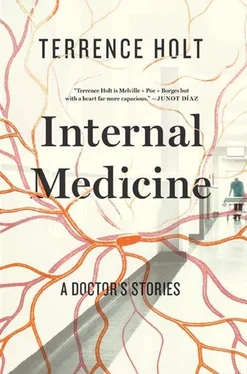“ Chest pain ,” she said again.
The patient was a short, fat man with a moon-shaped face that was gray and sweaty.
“It’s a heart attack, isn’t it, Doc?” he said as we entered the treatment room. Nurse Gary, who could have filled most of the room if he had entered, remained in the doorway, which he screened entirely from the men in the hallway. A crowd was gathering.
We are not supposed to tell patients in F-Max anything. I find this hard at the best of times, but especially so when the patient is scared. “Too soon to tell,” was all I could say, even though this was one of those occasions when the diagnosis is clear from the doorway.
“But it is, Doc. I can tell.” His voice was high-pitched, veering toward panic.
“How can you tell?” This was Joe.
“Same pain. Same pain as last time. And the time before that.”
“When was that?”
“When? When I had my heart attacks. I’ve had two. Don’t you know that? And my cholesterol’s high. And I know my diabetes is out of control. It’s the food in here. It’s all starch. All of it.” He held out two tremulous hands, lifted his arms at either side to show us his silhouette. “Look. I just keep gaining weight. And it’s all around my middle.”
“Okay,” I said. “Calm down.”
“Calm down? I’m having a heart attack. What’s wrong with you people?”
WHEN THE EMTS ARRIVED, wrestling their equipment through the doors, Lucy greeted them by name, adding, “Yeah, it’s Woody again. Remember him? One who burned his house down?”
The lead tech gave her a flat stare, then turned and gave the gurney a sharp shake that dropped its wheels to the floor.
There was a tedious exchange about papers, during which the techs strapped Woody to the gurney and swung it end for end in the narrow hallway. Behind us, I became aware of several dozen figures looking on. I fought off the urge to look over my shoulder, and moved in the opposite direction, to the gurney’s side.
Woody’s round face shone up at me. He had oxygen on by then, but he looked even grayer.
“You okay?” I said.
He nodded nervously, but didn’t say anything. He was looking up at the ceiling, lips moving soundlessly, as they wheeled him down the hall. It was pretty clear that he was praying. The thought struck me funny, briefly. Immediately thereafter I felt an inward squirm: How could I have thought that was funny? Sometimes it seems this place gets into you, and that all your reactions are becoming pathological. Sometimes it seems the real pathology is doubting yourself this way. In either case, the sensation is enough to make you hurry your steps to the next call — as if you could outrun such pursuit.
THE NEXT WAS A GUY on Acute Men’s, who according to the nurse had a temperature of 106.3. There didn’t seem anything else wrong, the report said, but the temperature was 106.3. This seemed unlikely, but if it was real it was probably the most acute thing on Joe’s list.
The patient was seated on his bed, hands clasped between his knees, head bowed.
“Mr. Bowen?” Joe called softly from the doorway.
The face turned up. It belonged to a thin young man who couldn’t have been out of his twenties. He looked at the doorway without much acknowledging us.
“It’s Dr. Bellagio,” Joe said in the same quiet tone. “May we come in?”
The patient made a series of spasmodic moves toward the wall that made me think of cornered prey.
“It’s okay, Mr. Bowen,” Joe said. “You remember me. I’m Joe Bellagio, one of the doctors.”
He stared at Joe.
“How are you feeling?”
“Okay.”
The matter-of-factness of his answer startled me.
“The nurse thought you might be running a fever.”
The patient looked past us to the door and shook his head, miming an obscure warning.
His voice dropped to a whisper. “It’s in my shoe.”
“Ah,” said Joe. He turned to me. “Mr. Bowen believes he has a transmitter in his shoe.”
Before I could catch myself, I looked at Mr. Bowen for confirmation.
“It’s not just a transmitter,” he said reproachfully.
“He believes it tells him things.”
Bowen’s expression was almost sullen. “It does.”
“Is it telling you anything now?”
Bowen cocked his head. “It’s listening.”
“To us?”
He shook his head.
“To you?”
Nod.
“And who do you think it is this time?”
Bowen leaned close to us, and after scanning the hallway behind us whispered: “NPR.”
In spite of myself, I laughed out loud. Bowen recoiled fully into his shell, and it took Joe a long minute to coax him out.
“He’s sorry. He didn’t mean it. He just—” Joe looked over his shoulder at me, pleading. “He just doesn’t understand.”
Now I was the recipient of the reproachful stare. “I’m sorry,” I said experimentally. Bowen dropped his gaze to the floor, where a pair of battered penny loafers lay innocently askew.
“I know,” he said wearily. The eyes flickered up at me, the expression almost pleading. “But it’s true. They do listen.” He looked at me for a long, searching moment before turning again to the floor. “They do.”
I would like to say that I said something in return that expressed my deep sympathy and understanding. That I said something that showed Mr. Bowen the error of his ways, and that through my insight he was cured. Instead I simply stared at him, feeling the empathy one feels for an insect struggling with some heavy piece of debris: cold, fascinated. A brief shiver of disgust — the same almost physical qualm I had felt on F-Max — made me turn away to Joe. I said, “Are we picking up signs of fever here?”
Joe looked startled for a moment, then recollected himself. “No. Sorry, I guess we’re not.”
The exam was unremarkable. Temp was 98.4.
A PATIENT ON GERO had vomited about an hour ago, which put him next on the list. At the nursing station, the unit clerk looked up from a stack of charts. “He’s in the back hall.”
“What happened?”
“He’s been eating garbage again.”
This turned out to be less figurative than I thought. The patient, an eighty-three-year-old man whose history was a scant catalog of ordinary ills ending with “frontotemporal dementia with behavioral disturbance,” had been deposited here several years ago, apparently after a scuffle in his nursing home. He had a court-appointed guardian and a habit of eating out of the garbage cans.
“What does he eat out of the cans?” I asked.
The clerk looked at me. “Garbage.”
I started to request specifics, but Joe explained, “We see this sometimes. It isn’t food, if that’s what you’re asking. It’s anything.”
“Anything?”
“Oh, honey,” the clerk said. “You don’t want to know.”
“Do I?” I asked Joe.
Joe shook his head. “It’s pretty nasty. There’s something about it — it’s not just random, because he doesn’t pick up stuff off the tables, you know? It has to be in the garbage can. It has to be—”
“Garbage,” the clerk cut in. “Last week he yacked up a ball of tinfoil, two bottle caps, and a latex glove. And before that?” She shuddered, rolling her eyes. “Oh, honey.”
“Coprophagia,” Joe explained.
We found Reginald Scatliff in a back hallway. He was slumped on a low bench, leaning over a basin; a nurse sat at his side. As we approached, he retched loudly and emptily over the basin.
“He okay?” Joe asked.
“Oh, he’s okay,” the nurse said. She stroked what was left of Scatliff’s hair back from his face. “He’s just feeling a little upset,” she crooned. Then, in a stage whisper: “Something he ate disagreed with him.”
Читать дальше












